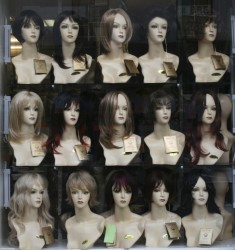Copyright, Plagiarism and Online Dating
 According to a study by U.S. researchers, 1 out of every 3 marriages in the country began online and tens of millions of other people are trying their luck, setting up profiles, searching for matches and hoping o find love.
According to a study by U.S. researchers, 1 out of every 3 marriages in the country began online and tens of millions of other people are trying their luck, setting up profiles, searching for matches and hoping o find love.
But while many of the perils of online dating are pretty well known, one of the lesser-discussed issues with online dating is the copyright and plagiarism issues that arise from it.
But what’s interesting about the issue isn’t that it exists, but the perception of it. While there’s a definite stereotype of an online dater ripping off images and prose to make themselves look better to potential mates, what’s less discussed is the other half of the question, namely the person whose work is lifted.
And then comes the more serious and disconcerting issue of who is really doing the the lifting? While sometimes it is a desperate online dating site member, it very often is a commercial interest, including spammers and even the dating sites themselves.
The simple truth is that online dating isn’t just about love, it’s also a big business, one worth an estimate $2 billion per year and growing.
Your profile isn’t just your chance at love, it might be someone else’s chance for profit.
Staying Out of Copyright Trouble While Dating Online
 Online dating is much like regular social media and posting anywhere else online. When it comes to copyright, there are two components to consider: How to avoid infringing the copyrights of others and how to protect your work from infringement by others.
Online dating is much like regular social media and posting anywhere else online. When it comes to copyright, there are two components to consider: How to avoid infringing the copyrights of others and how to protect your work from infringement by others.
The first element is actually the easiest to discuss and the best place to start.
Most online dating profiles typically have two copyrightable components contributed by the user, the photos of the person and the bio/description of them. While many sites have you answer questions, take surveys or generate a profile of their members, those elements are either created by the site, and thus owned by them, or are not copyrightable.
So with the photos and bio, the rule is fairly simple: Post only work that you have created or have permission to post. It’s the same there as it is anywhere else on the site.
That sounds simple enough. After all, online dating is supposed to be about representing yourself to others. If you used photos of another person or a bio written by someone else, you would not just be an infringer and a likely plagiarist, but you would be acting against the very spirit of online dating.
But it isn’t just the people who fake their profiles that run the risk of being called an infringer. For example, many people include poems or quotes in their profiles that might be copyright infringing, regardless of whether or not they are attributed.
However, by far the most common sticking point is the photos.
Simply because you are in a photograph doesn’t mean you are the copyright holder in it. It’s the person holding the camera that holds the copyright to an image. With self-taken photos (selfies) this isn’t an issue, but if you are using a photo taken by someone else without permission, there’s at least a potential copyright problem.
While it’s unlikely a friend or family member will demand you remove a photo they snapped, especially if you’re honest about how you want to use it, an issue can definitely arise with professionally-taken photos where you don’t have the rights to republish them, which is often the case.
Just because you paid to have a photo taken and bought prints of it doesn’t mean that you have purchased the copyright or even the right to use the photo online.
In short, the easiest way to avoid copyright issues while dating online is to ensure that you write your own text and only use photos that you have either taken yourself or received clear permission to use.
Spammers, Fake Profiles and Your Content
 But even if you do everything correctly and ensure everything in your profile is either yours or legal for you to use, the copyright troubles do not end there.
But even if you do everything correctly and ensure everything in your profile is either yours or legal for you to use, the copyright troubles do not end there.
Unfortunately, there are plenty of others out there who don’t share this level of honesty and will gladly make use of your content to their ends.
The biggest problem on dating sites, by far, is fake profiles.
According to the site SeekingArrangement.com, roughly one in every ten profiles on dating sites are fake and that’s just on legitimate sites who are actively trying to reduce the number of fake profiles.
In fact, SeekingArrangement.com says that they remove some 200 fraudulent accounts every day, over 60,000 total as of last year.
The reasons for these fake profiles vary. Often times it is scammers using the sites to lure other users into opening their wallets. Other times its spammers who just want to shoot out URLs to various sites, most of which are adult-oriented. However, in some situations, it’s the site itself setting up fake profiles to make it appear busy and active when, in reality, they have almost no human members.
But these fake profiles have to be filled out. They require images, bios and other text. To make matters worse, unlike traditional Web spam, it’s important that these profiles appear to be human. It isn’t good enough to just fool a search engine, other users of the site have to believe the fake profiles are real for the profiles to work.
So while this content can and does come from a variety of sources, including stock photo libraries and other websites, often times it is copied and pasted from other online dating profiles, either on the same site or a different one.
To make matters worse, since these profiles are set up and maintained through an automated system, once your photo or text ends up on one or two spam profiles, it will likely continue to appear on others down the road.
This can have a dire impact on your dating profile, not only because it makes it more difficult for others to find you (with so many fake copies of you on the Web), but it may also make it appear that you’re a fake user yourself, with photos and text widely seen elsewhere on the Web.
This makes it crucial to be thinking about these issues before you post your profile, so you can head off any issues before they become to big to tackle.
Protecting Yourself and Your Content
Other than revenge pornography, it’s difficult to imagine a more disconcerting infringement than finding your online dating profile being used by others online. Not only is it something designed to be a representation of you personally, but it is something that’s meant to be semi-private, only widely viewed by those who might be interested in you.
However, it’s also one of the more difficult types of infringement to protect against as many of the common steps used elsewhere aren’t appropriate on online dating sites.
For example, where watermarking images can be very effective when protecting images in a commercial environment, it makes online dating photos seem less genuine and more commercialized. In fact, it can give the impression that the user, no matter how legitimate, is fake.
As such, the only real prevention step that can be taken is to realize that your dating profile is, at the end of the day, a public place and anything you post there can be copied and reused with your permission or knowledge.
Beyond that, the best steps you can take are tracking and enforcement of your work, those steps include:
- Searching for Text: find unique phrases in your bio and search for them in Google. Likewise, you may be able to use a tool like Copyscape to help provide a more thorough search.
- Find Copied Images: Using Google Image Search, locate copies of your images on other sites or profiles. You may also want to try Tineye as an alternative.
- Remove Any Infringing Works: Finally, if you find any site or profile that is infringing your work, simply follow the steps in my Stopping Internet Plagiarism guide to get the content removed. Most dating sites have a robust DMCA or other copyright takedown procedure and will remove photos and/or text when notified.
However, this process won’t help you find uses of your content that is hidden from the search engines, such as walled garden dating sites and private profiles. In those cases, it is almost impossible to detect such infringements without having someone remember the content as yours.
However, given the millions of profiles out there, that is very unlikely to happen.
Bottom Line
Though people don’t typically think of online dating and copyright in the same sentence, the truth is that online dating sites are actually one of the riskier places to post your content.
Not only do spammers and scammers abound in the field, but other users and even the sites themselves often have reason for wanting to misuse your work.
As such, it’s best to be cautious about what you post on online dating sites, to be aware of the risks and, when possible, check to see if your content is being misused.
Even if you can’t stop the infringements, being aware of the problem lets you know when it might be a good idea to change photos or text. While it won’t get the infringements removed, it does prevent you from having a profile identical to countless spammers or scammers.
While it may seem to be a hollow victory, it is still better than not knowing at all and being oblivious about the problem altogether.
Want to Reuse or Republish this Content?
If you want to feature this article in your site, classroom or elsewhere, just let us know! We usually grant permission within 24 hours.
